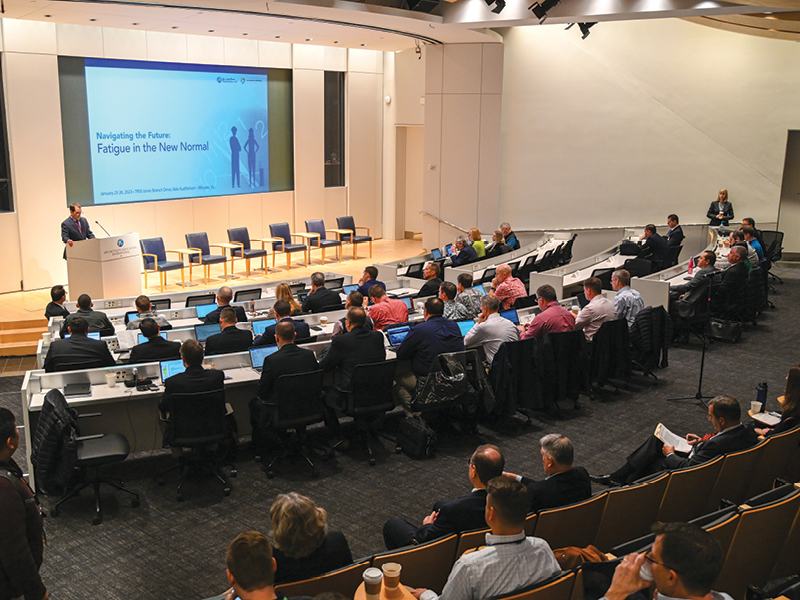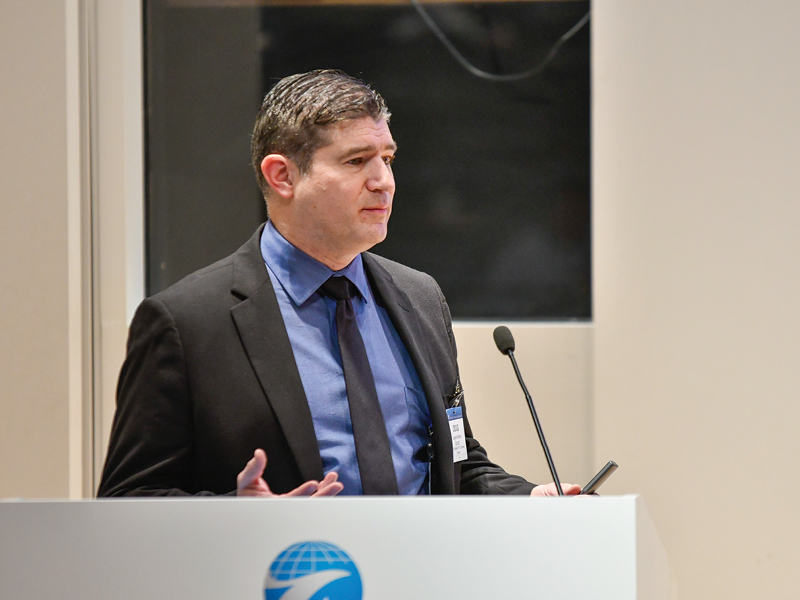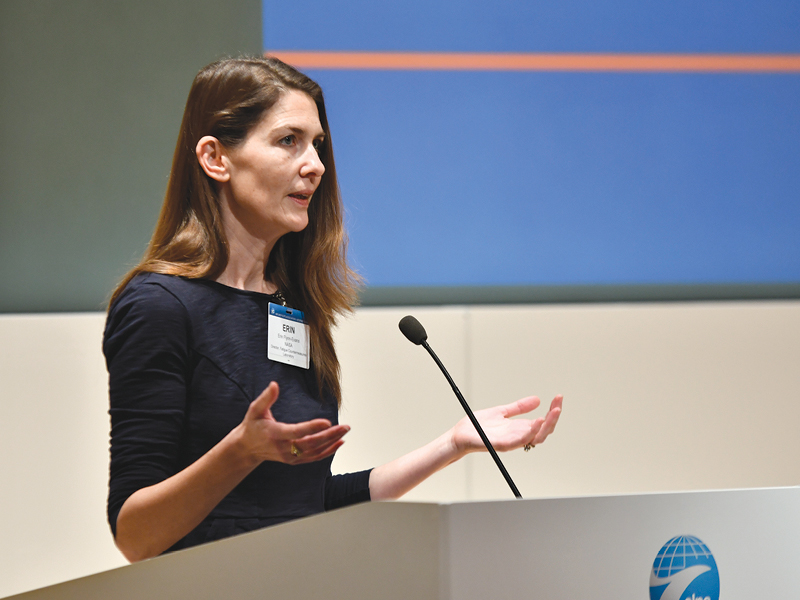Strengthening Safety Culture Through Fatigue Management
ALPA and A4A Host Annual Conference to Address Pilot Fatigue
By Gavin Francis, Senior Aviation Writer

Capt. Jason Ambrosi, ALPA’s president, addresses participants at this year’s Fatigue Management Seminar.
More than 140 participants gathered at ALPA’s offices in McLean, Va., on February 18–19 to take part in a two-day Fatigue Management Seminar organized by ALPA in partnership with Airlines for America (A4A). The annual conference brings together pilots, industry stakeholders, safety advocates, and researchers to discuss ways to mitigate risks posed by pilot fatigue.
“Mitigating fatigue is crucial for safety and it’s essential that we work together to create a system that enables pilots to be well rested throughout all operations,” said Capt. Jason Ambrosi, ALPA’s president, who welcomed attendees along with Graham Keithly, vice president and deputy general counsel for Regulatory Legal Affairs at A4A. “With our partners at airlines and government agencies like NASA, we’re doing a better job of understanding how fatigue impacts operations and how to avoid it. We’ve accomplished a lot to create a culture that safely and effectively manages fatigue, but we must never get complacent when it comes to safety. And, of course, we must continue to reinforce the truth that the most important safety element on any aircraft is having two well-trained, qualified, and well-rested pilots on the flight deck at all times,” Ambrosi remarked.
Pilot fatigue has been a central concern for ALPA since its inception in 1931, when pilots faced relentless pressure to fly long hours under dangerous conditions. Significant changes came about a decade ago as a result of FAR Part 117, the U.S. regulations governing flight-time and duty-time limitations and rest requirements for pilots operating under FAR Part 121. Implemented in 2014 after the 2009 crash of Colgan Air Flight 3407—where fatigue was identified as a finding—these rules represented the first major overhaul of pilot rest requirements in more than six decades.
“Looking back at our work after a month or a year, it can feel like we’re stuck in the same place,” said Capt. Doug Marchese (JetBlue), ALPA’s Flight Time/Duty Time Committee chair, who cohosted the conference with Capt. Matt Morely, a senior manager for Operations Performance at FedEx Express. “But when we look back at the years and decades, that’s when we start to see how far we’ve come. FAR 117 was a moment, a transition really. But it was also a starting point—a time for us to move forward and continuously improve our fatigue management, to look at our safety systems and see what the future should look like.”

Capt. Doug Marchese (JetBlue), ALPA’s Flight Time/Duty Time Committee chair, cohosts ALPA’s annual forum on pilot fatigue.
While FAR Part 117 has significantly improved fatigue management in commercial aviation, experts agree that more work remains. In recent years, ongoing operational disruptions, including flight delays, cancellations, and crew availability, continue to be a source of stress for pilots. Many report experiencing exhaustion before reaching their duty-time limits, raising concerns about the impact on flight safety.
Kye Johanning, director of ALPA’s Economic & Financial Analysis Department, and John Heimlich, A4A vice president and chief economist, kicked off the conference with a financial analysis of the airline industry, reviewing expectations and future trends. Participants then heard from experts on a variety of topics, including discussions about fatigue reporting, mental health and fatigue, pairing construction and fatigue feedback, and recent developments in fatigue research.
Capt. Dan Auslander (JetBlue), his pilot group’s Master Executive Council (MEC) Planning Subcommittee chair, teamed up with Greg Masters, manager of Fatigue Risk Management Systems at JetBlue Airways, to talk about pairing construction and fatigue feedback. Marchese and Capt. George Karambilas (Cargolux), a member of the International Federation of Air Line Pilots’ Associations Fatigue Management Working Group, spoke about operational experience in fatigue management. Marchese then joined Morely to give a Pilot Fatigue Working Group Joint Implementation Measurement and Data Analysis Team update.
Capt. Robert “Chip” Benton, senior manager for Flight Operations Fatigue Programs at United Airlines, provided an industry update on flight duty period (FDP) extensions, specifically looking at data from 2022 to 2024. Benton reported, “The rate of the number of FDP reportable events has gone down continuously. We’re down to less than one reportable FDP per 1,000 flights. And this is data that’s aggregated from American, Delta, Southwest, and United.”
Marchese led a panel discussion on pilot mental health and fatigue that included F/O Carrie Braun (JetBlue), ALPA’s Pilot Peer Support (PPS) Group chair; Dr. Jessica Auslander, an ALPA-contracted mental-health professional; Bill McDonald, managing director for Flight Operations at A4A; and Dr. Quay Snyder, ALPA’s aeromedical advisor and president of the Aviation Medicine Advisory Service.
Snyder also spoke about how pilots can develop resilience to ensure fitness for duty, underscoring the significance of sleep hygiene and outlining strategies for pilots to maximize sleep quality and avoid the long-term health risks associated with chronic fatigue.
“Everyone in here needs to know that fatigue is a flight safety issue and that’s why all these rules are in place,” said Snyder. “But what I hope to impress on you today is that it’s a health and well-being issue as well. I don’t want to minimize the safety issue. But for personal reasons, you need to take an aggressive approach to managing your sleep. You need to be disciplined to make sure you’re getting sleep on a regular basis. And you need to make it a priority.”
According to Snyder, many pilots push through fatigue without realizing that it can impair cognitive function just as much as alcohol. The key, he says, is ensuring that pilots recognize fatigue’s dangers and are proactive about getting good quality rest.
Morely moderated a panel discussion regarding the use of Safety Management Systems (SMS) to ensure that pilot fatigue remains a priority in aviation safety. The panel included Benton; Capt. Jerimy Maclellan (Delta), vice chair of his pilot group’s MEC Central Air Safety Committee; Capt. Mike Kulbacki (United), cochair of his pilot group’s MEC Fatigue Safety Action Group; Heather Fitzpatrick, manager for Pilot Fatigue and Ops Risk Management at Delta Air Lines; and Heather Provost, director for SMS at American Airlines.
A panel discussion on the Atlas Air operations analyst desk focused on day of operations. Panelists included Capt. David Boehm (Atlas Air), the International Brotherhood of Teamsters (IBT) Fatigue Committee chair; Capt. Robert Scheulen, IBT Fatigue Committee vice chair; Morgan Marais, manager for Fatigue Risk Management at Atlas Air; Trevin Works, lead Air Operations analyst at Atlas Air; and Ryan Piper, senior director for Crew Scheduling at Atlas Air. F/O Chandler Blair-Zinger (Alaska), her pilot group’s MEC Scheduling Committee chair, and Zak Klinck, manager for Fatigue Risk Management Systems at FedEx Express, later joined the panel for a Q&A session.
The second day of the seminar featured presentations by sleep scientists and researchers. Erin Flynn-Evans, Ph.D., director of the Fatigue Countermeasures Laboratory at NASA, provided information on an in-flight short-haul study that NASA recently completed.
“The FAA’s Civil Aerospace Medical Institute approached us about investigating short-haul operations because we just don’t have a lot of data to inform how those trips are scheduled and how those operations happen,” said Flynn-Evans. “We brought together a small stakeholder group from several airlines and labor representatives to talk about what we might do. Ultimately, we ended up with 90 pilots, short-haul operators in the U.S. who contributed to the study.”

NASA’s Erin Flynn-Evans provides information on an in-flight short-haul study that the agency recently completed.
Other speakers included Jaime Devine, Ph.D., director of Sleep Science at the Institutes for Behavior Resources, who spoke about fatigue and workload in aviation, and Tomas Klemets, head of Scheduling Safety at Jeppesen, who gave his organization’s perspective on model usage, data collection, and development.
The final panel of the seminar was a discussion on biomathematical modeling, which was moderated by Capt. Robert Bassett (FedEx Express), chair of his pilot group’s MEC Fatigue Risk Management Committee. The panel included Klemets; Devine; Klinck; Steven R. Hursch, Ph.D., president and chief scientist at the Institutes for Behavior Resources; and Adrienne Phillips, regional manager for Pilot Scheduling at Delta Air Lines.
As aviation adapts to evolving operational demands, combating pilot fatigue must remain a top priority. Collaborative efforts among pilots, airlines, and regulators will be essential in strengthening safety measures to ensure that pilots remain well rested and fit for duty. Insights shared at gatherings like this year’s Fatigue Management Seminar will shape future efforts to refine policies and enhance scheduling practices, laying the groundwork that will protect future generations of ALPA members from the threat to safety posed by fatigue.

